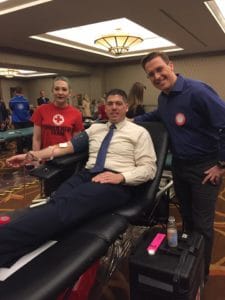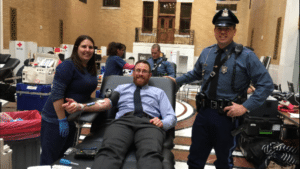As a law enforcement officer and paramedic for many years, I knew the importance of blood donations and emergency medical training. However, I was not a regular blood donor. Witnessing a fellow police officer’s injury and helping with his recovery drove the importance of being a blood donor home for me.
On April 19, 2013, I responded to the scene in Watertown, Massachusetts where two suspects in the murder of MIT Police Officer Sean Collier and the Boston Marathon bombings exchanged gunfire with law enforcement and detonated several IEDs. Transit Police Officer Richard “Dic” Donohue was shot in the right leg during this exchange. This wound severed his femoral artery, which resulted in immediate uncontrollable blood loss.
Upon learning that an officer was down, I located Dic in the driveway of a home. His heart had stopped and CPR was in progress. I observed that Dic had lost most of his blood less than one minute after being shot. As a paramedic, I focused on getting Dic transported out of the scene and to the closest hospital as fast as possible. Two Watertown firefighter/EMTs and I treated Dic en route to the hospital while a Watertown Police Officer drove the ambulance.
Dic required blood transfusions immediately upon arrival. Less than ten minutes after being shot, Dic was being treated by doctors in the emergency room at Mt. Auburn Hospital. More than 46 blood products were needed to save his life that night.
Forty-five minutes after Dic was shot, his heartbeat returned, and he was moved into an operating room for a lengthy operation. Additional blood products were rushed to Mt. Auburn Hospital from the American Red Cross and other hospitals by police officers.
Dic’s survival was only possible due to the speed with which a team of first responders and hospital staff worked together to treat Dic. Without quick access to blood, he would have died.
Efforts to Raise Awareness for Blood Donations Today
Since April 2013, I have been a volunteer with the American Red Cross and a regular blood donor. I recognize that the blood a donor gives today could save the life of you or someone you know tomorrow. I have also trained extensively in the use of life saving procedures involving bleeding control techniques and the use of tourniquets in emergencies. Recently, I became an instructor in tactical emergency medical care.
My wife Kerrie and I continue to encourage others to donate blood. Dic and I have taken his story of survival to many different audiences to include police administrators, recruits, college students and other public safety professionals with the goal of increasing training and blood donations even more.
While we have had success in organizing blood drives and expressing the need for more blood donors, the five-year anniversary of Dic’s injury only reminds us that there are still many who could donate blood, but fail to do so. We hope to continue our progress through education and participation with Red Cross activities.
Make an Appointment to Give
You can schedule a blood or platelet donation by using the Red Cross Blood Donor App, visiting redcrossblood.org or calling 1-800-REDCROSS (1-800-733-2767).


